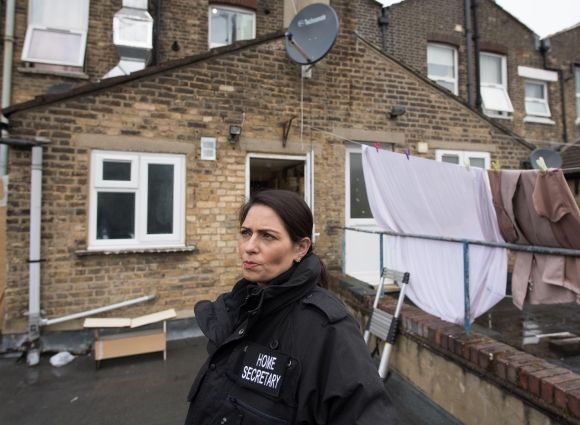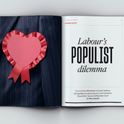Labour’s recent drubbing in Hartlepool and other working-class strongholds is a symptom of a wider problem: the rise of English nationalism. And there is no easy solution.
Three months ago, during an online session of the Public Accounts Committee, James Wild, a Conservative MP for a leafy part of Norfolk, asked what one political commentator said may be “the stupidest question ever asked by an MP.” It may not have been, but only because there are many contenders for that honour. The committee was interviewing the BBC director general, Tim Davie, about the corporation’s annual report. Wild wanted to know how many images of the Union flag were to be found in the document. Davie was momentarily stumped. “Of all the briefings I got for this meeting, that was not one of them, I am afraid.”
“Well it’s zero. Do you find that surprising?” Davie remained dumbfounded: “It’s a strange metric…” He did, however, point out that the Union flag was to be seen flying over Broadcasting House, if the MP would care to go and take a look. Wild was unimpressed. “My constituents would expect more,” he said.
There have been ominous straws in the wind for some time. In October 2017 a Tory whip, Chris Heaton- Harris, wrote to all university vice-chancellors asking for the names of all professors teaching European affairs “with particular reference to Brexit.” He also asked to be provided with copies of the links to the relevant syllabuses. His letter caused a brief flurry and murmurs of “McCarthyism.” Theresa May’s Downing Street conspicuously failed to come to his defence, and the issue died.
In the Boris Johnson era, however, it is increasingly difficult to dismiss such incidents as the ravings of lone backwoodsmen. The culture secretary, Oliver Dowden, recently decreed that henceforth all government buildings must permanently fly the flag. In parallel the local government minister, Robert Jenrick, wrote to local authorities encouraging them to fly the flag on their buildings. Health secretary Matt Hancock is demanding that all hospitals fly the flag. And behind the cover of the flag, the government is attempting to slash overseas aid and increase our stock of nuclear weapons, together with an apparent determination to neuter the allegedly unpatriotic BBC.
Although we British have long been prone to outbreaks of nationalism, until recently obsessive flag waving was by and large confined to small far-right parties, Northern Irish Unionists and a bunch of Hooray Henrys and Henriettas at the Last Night of the Proms. But the Brexit referendum and its aftermath has ushered in a new era. Our ruling party seems to have fallen prey to a brand of nationalism that is, despite all the Union Jacks, not so much British as English. On occasion it can be extreme. In June 2019, a YouGov poll of grassroots Tory members found that 61 per cent were prepared to countenance “significant” economic damage, if that was what it took to achieve Brexit. Fifty-nine per cent were prepared to contemplate the loss of Scotland or Northern Ireland and, most astonishing of all, 54 per cent thought the destruction of their own party would be a price worth paying for Brexit.
“It is an abiding myth that the working class is necessarily left-wing and internationalist”
In quarters well beyond the liberal left, alarm bells have begun to ring. “Somewhere along the line from the early 1990s the cause of honest and thoughtful Euroscepticism mutated into a form of simplistic nationalism,” writes Alan Duncan, who describes himself as a Eurosceptic in his recently published diaries. In September 2019 a Tory candidate for the Greater London Authority resigned, saying the Conservative Party had been taken over by a cult. Soon after, 21 Tory MPs—including dry-as-dust former chancellor Philip Hammond—were expelled for refusing to toe the line on Brexit. Among them were several former cabinet ministers and Winston Churchill’s grandson, Nicholas Soames.
Since then, in parliament at least, the old liberal “one nation” Tory has become an almost extinct species, moving only under the cover of darkness. There is still a brave band of backbench Tories called the One Nation Group. But at last count, on paper at least, the One Nation Group had just 28 members, and the active membership is much lower. Braver still are members of an organisation who until recently called themselves Conservatives for Europe. Lately they have rebranded as the Conservative European Forum. Its published list of officers is a long parade of the old grandees—John Major, Michael Heseltine, Ken Clarke and Theresa May’s deputy David Lidington—but all the still-serving Tory MPs, bar Stephen Hammond, appear to be keeping their heads well down.
With the coming of Brexit, passions that have long laid dormant have been unleashed. Not that they ever quite went away. There are fights over statues, “free speech” and the teaching of history, all designed to give a nostalgic nod to “simpler times” and former greatness. These days no interview with a government minister, either at home or in the office, is complete without a large Union Jack prominent in the background. My own MP, the business minister Anne-Marie Trevelyan, has even been pictured on screen alongside an outsize Union flag wearing a jacket with a red, white and blue collar. This sudden patriotic upsurge has not come about by accident. It has been decreed from on high. Somewhere in official archives, there is a memorandum, perhaps signed by the prime minister himself, instructing ministers to display the flag at every opportunity. And the virus is infectious: the leader of the opposition, Keir Starmer, has taken to sitting alongside the flag when he addresses the nation.
Is this really a sign that Britain has been reborn as an independent, confident nation with a glorious past, which must be celebrated at every opportunity? Or is it a sign of our shrinking national esteem? Of growing isolation? Of diminishing self-confidence? Of a Britain which—60 years after the US secretary of state Dean Acheson made the observation—has lost an empire but not yet found a role?
Of course it is nothing new for politicians, especially on the right, to wrap themselves in the flag at moments of triumph or crisis. Remember those photos of Margaret Thatcher in windproof overalls and goggles, the Union flag fluttering behind her, in the turret of a Chieftain tank? Or the carefully choreographed celebrations of the British victory in the Falklands?
But this time it’s different. Something fundamental has changed. With the coming of Brexit the nationalist genie is out of the bottle and will not easily be put back. English nationalists always lurked in the Tory Party, of course. Witness Sasha Swire, whose Diary of an MP’s Wife made a brief splash. She described the members of her husband’s East Devon Conservative Association thus: “They hate in equal measure: foreigners, Europe, defence cuts, gay marriage, liberals, the BBC, Germans, the Japanese, the [Cameron] coalition and garlic.” A caricature, of course, but as any honest Tory will concede, one with a large grain of truth.
Until recently, however, the Conservative leadership seemed keen to put such crude stereotypes behind it. The party is nothing if not adaptable. David Cameron and George Osborne were modernisers, determined not to waste time pretending they could turn back the clock, and eager to change what Theresa May once described as the image of the Tories as “the nasty party.” Economically dry but socially liberal, Cameron and Osborne were also internationalists. They took pride in increasing overseas aid and were, when push came to shove, prepared to engage with Europe. But it was Europe, of course, that did for them in the end.

It was a long-running Tory sore, but—significantly—the bloc that determined the outcome of the Brexit referendum was not the core Tory vote. They were already a lost cause. No, the referendum was lost in what used to be the Labour heartlands of the north. The obvious question is what caused this retreat into nationalism on the part of Labour’s core voters?
It is an abiding myth, especially among young idealistic Labour supporters, that the working class, given suitably inspiring leadership, is necessarily left wing and internationalist. An acquaintance of mine, from a modest background but these days a rather grand figure in the House of Lords, once advised me thus: “What you’ve got to realise, Chris, is that all the instincts of the working class are Tory. On race, patriotism, the Bomb, you name it. It’s just that they happen to vote Labour. Murdoch understands that, which is why the Sun has been so successful.”
As someone who represented a so-called Red Wall seat for 23 years, I can confirm that this is so. The merest suggestion that the UK could live without nuclear weapons induced apoplexy among some of my working-class constituents. The late William Rees-Mogg, father of Jacob and a former editor of the Times, was in an earlier incarnation the Conservative candidate for the one-time Labour stronghold of Chester-le-Street. He remarked later that during the course of his election campaign he encountered some of the most right-wing people he had ever met.
A suspicion of foreigners was the key to Brexit. Foreigners in the shape of not just EU bureaucrats, but also asylum seekers and the influx of guest workers from eastern Europe. What the “metropolitan elite”—and indeed the leadership of all the main political parties—failed to grasp was just how deep this ran, and what atavistic prejudices were waiting to be mobilised once the spark was lit by a sufficiently charismatic political leadership. That was duly supplied by Nigel Farage. Most British people, for all that they are conservative in outlook, are not particularly tempted by extremism. Over a long period, attempts by a succession of flag-waving fascist parties to arouse fear and loathing among the masses had come to nothing. But with the arrival of Ukip —which, despite attracting some oddballs, was not fascist—the hour had come. Cameron’s referendum provided a cause to which many people could relate.
Both the main parties must accept a share of responsibility for what is happening. The Tories, because they have for decades played the immigration card at almost every general election and often in-between. Tony Blair, too, made a big mistake when, during the negotiations over the EU accession of eastern and central European countries, he waived the UK’s right to a moratorium of up to seven years on the opening of our borders to workers from the new member states. His decision was based on the assumption that most existing member states, Germany in particular, would do likewise, but he went ahead without waiting to find out. In the event only two other existing members—Ireland and Sweden—opened up immediately. The rest opted for a phased integration of the new member states. Blair was also influenced by research commissioned from University College London, which predicted that free movement would likely result in no more than 13,000 migrants over a decade. It proved a massive underestimate. But when the decision was made in 2003, it attracted surprisingly little comment. The economy was booming and both main parties took the view that it would benefit from the migrants, and to an extent it did. Only when Farage and Ukip started making political capital with the issue did the Tories and their media friends begin to take full advantage of what they dubbed Labour’s “open door” policy.

This is the background to Labour’s present woes, as well as the single greatest reason for the referendum result. From 2010 onwards, migration from eastern Europe was a major political issue. Perversely (fear of the unknown is always more potent than reality), areas with fewer EU migrants often voted more heavily for Brexit. Come the 2019 general election and, although there were other factors such as a dislike of Jeremy Corbyn, after two years of wrangling over the terms of our departure from Europe the decisive argument was: “Get Brexit Done.” And with it came the implication that we would reassert control over our borders.
The Tories had learned a valuable lesson. Had they gone for anything other than the hardest possible Brexit, Farage and his followers (now reborn as the Brexit Party) would have stood candidates against them and split the anti-Labour vote. In the event, “sovereignty” was pursued at the expense of everything else, including the future of Northern Ireland, and Farage was bought off. At the last moment, he agreed that his party would only field candidates in Labour and Liberal Democrat-held seats, with predictable results.
The electoral map in England was redrawn, and the lesson of this spring’s elections appears to be that this is beginning to stick (see box on previous page). The political faultlines are no longer between rich and poor, north and south, working class and middle class. They are between young and old, those who have benefitted from higher education and those who haven’t, those who wanted to “Get Brexit Done” and those who didn’t. The Tories have discovered a formula that works in this new English landscape, just as Scotland has gone off on a trip of its own: as recently as 2010, 41 of its 59 MPs were Labour. Today, there is just one.
“The Cabinet is composed almost entirely of English nationalists, or at least those prepared to chant the slogans of the hour”
The Cabinet is composed almost entirely of English nationalists or those prepared to chant the slogans of the hour. The party of Disraeli, Macmillan, Heath, Major, Cameron, even Churchill—his name is still a card played from time to time—has been taken over by people with a narrower mindset. The impact on the UK economy remains an open question, but the omens are not auspicious. There is no sign that the recent decline in trade with the EU will be compensated for by increased trade with the rest of the world. Many British companies have moved offshore or set up outposts within the EU. A couple of years ago, on a visit to Ireland, I was given a lift to the airport by a former Fine Gael MP. Brexit, he said, was bad news for Ireland: “There is one silver lining, however. Many British companies are setting up shop here.”
But will anybody in the UK notice? In one respect, Covid has proved a boon for the Brexiteers. As a former French ambassador recently said: “The bill for Brexit can easily be swept under the Covid carpet.” All the more so since the success of the British vaccine programme has got the government off the hook for its mishandling of the earlier stages of the crisis.
The Tory Party is now firmly in the hands of English nationalists. I do not see this changing in the near future. Flag-waving is all very well, but eventually they will need more to offer. In due course, I would not rule out a referendum on the reintroduction of the death penalty. Britain would have to withdraw from the European Convention on Human Rights, but the next step in the plan may be precisely that. The year before Boris Johnson brought him into Downing Street, Dominic Cummings wrote on his blog that once Brexit was done “we’ll be coming for the ECHR referendum and we’ll win that by more than 52-48.”
The path would then be clear to bring back the gallows, but it wouldn’t get through parliament directly—what is easier to imagine is the matter being thrown over to the public. Proponents would need to choose their moment carefully—the immediate aftermath of a terrorist incident or a particularly shocking murder, such as that of the young woman recently kidnapped and killed in south London.
It may also have to be at a time after the torch has passed from Johnson: the great irony with him leading an English nationalist government is that he is a shameless opportunist rather than a right-wing ideologue, who retains some libertarian instincts and is on the record against capital punishment. But he has ambitious colleagues like Michael Gove, who in an article for the Times once flirted with bringing back hanging, and has been quiet on the subject since. Then there is the home secretary, Priti Patel, who is perfectly capable of taking us down that road. It could even be her calling card in her leadership election campaign.

I do not say this will happen, but I would not dismiss the possibility out of hand. For those who still think I exaggerate, here is former Sun editor, Kelvin McKenzie, celebrating Brexit earlier this year: “The establishment were against it and at least two former Tory prime ministers were against it. And yet we won. An astonishing victory. Now for a referendum on the death penalty…” McKenzie has form on this issue. This is what the Sun, which he then edited, had to say in 1988 about the six innocent men convicted of the Birmingham pub bombings who would finally be cleared three years later: “If the Sun had its way, we would have been tempted to string ‘em up years ago.”
There’s a 1970 National Front poster, headed “Put Britain First,” which often resurfaces on social media. It set out the party’s programme as follows: “Reject the Common Market. Restore Capital Punishment. Make Britain Great Again. Scrap Overseas Aid. Rebuild Our Armed Forces.” We are not quite there yet, but most of these boxes are in the process of being ticked.
Now read: The political science of how English nationalism is becoming entrenched












